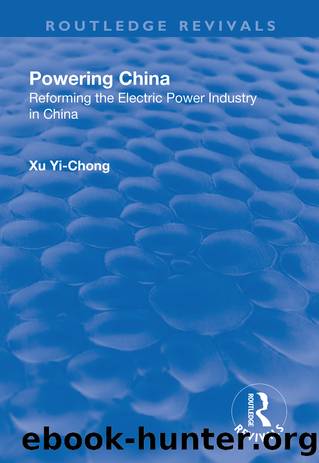Powering China:Reforming the Electric Power Industry in China by Xu Yi-chong

Author:Xu Yi-chong [Yi-chong, Xu]
Language: eng
Format: epub
Tags: Social Science, General, Sociology
ISBN: 9781351731942
Google: LQTFDwAAQBAJ
Publisher: Routledge
Published: 2018-02-05T03:34:26+00:00
The study also identified a series of responsibilities as government policies which therefore should be excluded from the regulatory authority. They included allocation of subsidies, development of national overall plans, determination of the structure of the industry and approval for using government funds and foreign exchange in investment.
In the process of preparing for the creation of the SPCC, the proposal to create an independent regulatory agency emerged, It was recommended that 'all regulatory responsibilities for the power sector to be allocated to a particular level of government should be consolidated within one government institution'.56 The State Council would have the responsibility for the creation of such a regulatory agency, which should be an independent, single-sector regulatory agency with broadly defined obligations so that it would be able to regulate while allowing power enterprise managers to manage. Given that the power industry was being corporatized and competition was being introduced into power generation, it was important to clarify the responsibilities among three major institutions in the power industry in China: the SPCC, the SDPC and the SETC. In theory, and in law, each has its designated responsibilities. As a corporation, the SPCC is supposed to be in charge of the development of the country's power industry. As a supraministerial agency, the SDPC is in charge of national economic planning and macroeconomic management. The SETC is designed to be the macroeconomic department regulating the short-term operations of the national economy. All three are responsible to the State Council. Yet, despite the call by reformers in China and the World Bank, no independent regulatory agency was created and the mandates given to these three institutions often led to more conflicts than cooperation, especially between the SDPC and the SPCC. The root of the problem is not only the tradition and legacy of the central planning, but also the ambiguity of the laws which delineated their responsibilities.
When the SPCC was created on 7 December 1996, the State Council stated that the MEP would continue its government administrative functions, give its responsibility for operating and managing state assets to the newly created SPCC, and transfer some regulatory and professional functions to the China Electric Power Enterprise Council (known as the China Electricity Council, or CEC). The document issued by the State Council emphasized the separation of government functions from economic ones. Yet it neither mentioned the creation of a regulatory regime which would be any different from central planning, nor explained the relationship between the State Planning Commission (SPC) and the SPCC or the distribution of responsibility for investment or pricing decisions between the SPC â which was continuing its role as a central planner in terms of determining the project investment and power tariffs for the country â and the State Economic Commission (SEC) â which at the time was in charge of coordinating the economic reform of all sectors â over the issue of investment or price decisions. It was well accepted by outsiders that the regulatory functions would be taken over by the CEC, especially in the areas of quality, safety and professional standards.
Download
This site does not store any files on its server. We only index and link to content provided by other sites. Please contact the content providers to delete copyright contents if any and email us, we'll remove relevant links or contents immediately.
| Anthropology | Archaeology |
| Philosophy | Politics & Government |
| Social Sciences | Sociology |
| Women's Studies |
The Secret History by Donna Tartt(19083)
The Social Justice Warrior Handbook by Lisa De Pasquale(12190)
Thirteen Reasons Why by Jay Asher(8907)
This Is How You Lose Her by Junot Diaz(6885)
Weapons of Math Destruction by Cathy O'Neil(6279)
Zero to One by Peter Thiel(5798)
Beartown by Fredrik Backman(5751)
The Myth of the Strong Leader by Archie Brown(5507)
The Fire Next Time by James Baldwin(5440)
How Democracies Die by Steven Levitsky & Daniel Ziblatt(5218)
Promise Me, Dad by Joe Biden(5153)
Stone's Rules by Roger Stone(5087)
A Higher Loyalty: Truth, Lies, and Leadership by James Comey(4959)
100 Deadly Skills by Clint Emerson(4924)
Rise and Kill First by Ronen Bergman(4788)
Secrecy World by Jake Bernstein(4751)
The David Icke Guide to the Global Conspiracy (and how to end it) by David Icke(4717)
The Farm by Tom Rob Smith(4506)
The Doomsday Machine by Daniel Ellsberg(4489)
